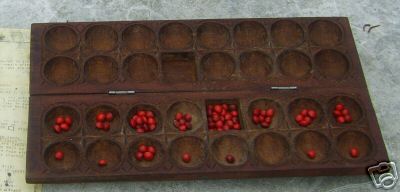
By Jennifer Mueller
Bao. The word literally means wood or board in Swahili, but it is also a game--one of the most popular through East Africa. I learned to play after some Peace Corps volunteers brought it back when they returned from a trip to the coast. It's certainly addicting, and while it might look simple. it takes quite a bit of skill. Many have heard of Mancala--it's available in United States toy stores--but Bao is more complicated since it is played with a board double the size of Mancala. Some call Bao the "king of mancala games," as it is usually considered the most difficult and complex of them.
 A Bao board consists of four rows with eight holes each. All the holes are rounded, but the fourth from the right in the middle rows is square and called the nyumba ("house"). Games can take hours, and a quicker version of the game involves putting two seed per hole to start with, instead of the 6-2-2 set up of the official rules. To start, you add a reserved seed to a space with seeds already in it, that allows you to capture from the opposite space of your opponent. You then proceed to spread out how many seeds you captured, ending in another space already with at least one allowing you to repeat the process. Your turn ends only when you land in a space without anything in it.
A Bao board consists of four rows with eight holes each. All the holes are rounded, but the fourth from the right in the middle rows is square and called the nyumba ("house"). Games can take hours, and a quicker version of the game involves putting two seed per hole to start with, instead of the 6-2-2 set up of the official rules. To start, you add a reserved seed to a space with seeds already in it, that allows you to capture from the opposite space of your opponent. You then proceed to spread out how many seeds you captured, ending in another space already with at least one allowing you to repeat the process. Your turn ends only when you land in a space without anything in it.
As all the pieces are in play after adding one per turn, you are moving quite a few seeds around. You must capture if able, but you are also allowed to have a turn to redistribute. However, if on the first move you do not capture, your entire turn must not capture. The object is to rid your opponent's front row of seeds. Regardless of how many might be on the back row, they are unable to move if there are none left in front.
Children have been known to play it with just holes scooped out of the dirt and stones, but it is a mainstay of the coasts of Kenya and Tanzania where it is played in elaborately carved boards. The game is commonly played as diversion while waiting for dinner in cafes, but there are also clubs since many cannot afford the boards to play it at home. Regular championships are held on Zanzibar and Lamu (Kenya) and in Malawi. The only tournament that was held in Europe is organized at the Mindsports Olympiad (MSO) in Cambridge, England.
Bao. The word literally means wood or board in Swahili, but it is also a game--one of the most popular through East Africa. I learned to play after some Peace Corps volunteers brought it back when they returned from a trip to the coast. It's certainly addicting, and while it might look simple. it takes quite a bit of skill. Many have heard of Mancala--it's available in United States toy stores--but Bao is more complicated since it is played with a board double the size of Mancala. Some call Bao the "king of mancala games," as it is usually considered the most difficult and complex of them.
 A Bao board consists of four rows with eight holes each. All the holes are rounded, but the fourth from the right in the middle rows is square and called the nyumba ("house"). Games can take hours, and a quicker version of the game involves putting two seed per hole to start with, instead of the 6-2-2 set up of the official rules. To start, you add a reserved seed to a space with seeds already in it, that allows you to capture from the opposite space of your opponent. You then proceed to spread out how many seeds you captured, ending in another space already with at least one allowing you to repeat the process. Your turn ends only when you land in a space without anything in it.
A Bao board consists of four rows with eight holes each. All the holes are rounded, but the fourth from the right in the middle rows is square and called the nyumba ("house"). Games can take hours, and a quicker version of the game involves putting two seed per hole to start with, instead of the 6-2-2 set up of the official rules. To start, you add a reserved seed to a space with seeds already in it, that allows you to capture from the opposite space of your opponent. You then proceed to spread out how many seeds you captured, ending in another space already with at least one allowing you to repeat the process. Your turn ends only when you land in a space without anything in it. As all the pieces are in play after adding one per turn, you are moving quite a few seeds around. You must capture if able, but you are also allowed to have a turn to redistribute. However, if on the first move you do not capture, your entire turn must not capture. The object is to rid your opponent's front row of seeds. Regardless of how many might be on the back row, they are unable to move if there are none left in front.
Children have been known to play it with just holes scooped out of the dirt and stones, but it is a mainstay of the coasts of Kenya and Tanzania where it is played in elaborately carved boards. The game is commonly played as diversion while waiting for dinner in cafes, but there are also clubs since many cannot afford the boards to play it at home. Regular championships are held on Zanzibar and Lamu (Kenya) and in Malawi. The only tournament that was held in Europe is organized at the Mindsports Olympiad (MSO) in Cambridge, England.